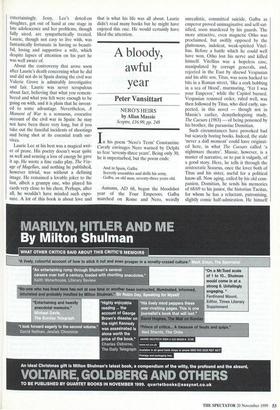A bloody, awful year
Peter Vansittart
NERO'S HEIRS by Allan Massie Sceptre, £16.99, pp. 248
In his poem 'Nero's Term' Constantine Cavafy envisages Nero warned by Delphi to fear 'seventy-three years'. Being only 30, he is unperturbed, but the poem ends:
And in Spain, Galba Secretly assembles and drills his army.
• Galba, an old man, seventy-three years old.
Autumn, AD 68, began the bloodshot year of the Four Emperors. Galba marched on Rome and Nero, weirdly unrealistic, committed suicide. Galba as emperor proved unimaginative and self-sat- isfied, soon murdered by his guards. The more attractive, even magnetic Otho was proclaimed, but swiftly opposed by the gluttonous, indolent, weak-spirited Vitel- lius. Before a battle which he could well have won, Otho lost his nerve and killed himself. Vitellius was a hopeless case, manipulated by corrupt generals, and, rejected in the East by shrewd Vespasian and his able son, Titus, was soon hacked to bits in a Roman street, 'like a cork bobbing in a sea of blood', murmuring, 'Yet I was your Emperor,' while the Capitol burned. Vespasian restored order, ruled well, was then followed by Titus, who died early, sus- pected, in this novel — though not in Massie's earlier, demythologising study, The Caesars (1983) — of being poisoned by his brother, the paranoiac Domitian.
Such circumstances have provoked bad but scarcely boring books. Indeed, the stale 'never a dull moment' could have originat- ed here, in what The Caesars called 'a nightmare theatre'. Massie, however, is a master of narrative, or to put it vulgarly, of a good story. Here, he tells it through the aristocratic Scaurus, once the lover both of Titus and his sister, useful for a political know-all. Now aging, exiled by his old com- panion, Domitian, he sends his memories of 68/69 to his junior, the historian Tacitus, for whom he has a reluctant, patronising, slightly comic half-admiration. He himself
is egotistical, vain, sceptical, convinced, from history and personal experience, that others are essentially wicked, achieving virtue only despite nature and by great labour. Massie certainly provides him with substantial evidence, culled from the hor- rors, cavortings and absurdities which, unlike Tacitus, he actually witnessed.
The truth is that Tacitus will present men and women as if they are capable of being understood. There is no other way of writ- ing history, perhaps. It is the impulse of historians to make sense of what happens. But can the sense they create be true to experience? I think not. Does any man really understand even himself?
Tacitus maintains that character is finalised at birth, Scaurus is more fluid, allowing for the effect of accident, the unpredictable, even of superstition. History is not science but art, though dealing only with crimes and folly. Tacitus' fine History will be impaired by lack of imagination. Scaurus can add atmosphere, graphic details, subjective fancies. He has stylish descriptive powers, memorably on Nero's death — 'Nero was a liar to the last, claim- ing that he died an artist. The truth was that he never was an artist, he was merely artistic' — and on Galba's fall, Otho's despairing loneliness, and the phantas- magoric 'reign' of Vitellius.
Events are too headlong to allow much psychological insight or personal develop- ment, save that of Scaurus himself, with his mounting disillusion with Rome and his own career. In his acrid way, he can distil much of himself in a sentence:
He had an elder brother who became a bankrupt and cut his throat because Tiberius denied him a provincial command which he didn't deserve, but had hoped to use to mend his fortunes by screwing the provincials in the fine old Republican fashion, as practised by that arch-hypocrite, Marcus Brutus.
The others are actors in a lurid pageant literally, for pageantry was essential for Rome's control of populations largely illit- erate.
Massie, as always, and controversially, briskly scatters such expressions as 'esprit de corps', 'on the nail', 'having a look-see'. More important, he implies interesting questions. Why, in all this turmoil, should anyone wish to be emperor? Scaurus thinks only for power and 'honour'. Titus is more idealistic, in a defence of empire which looks back to Virgil, forward to Macaulay, Ruskin, John Buchan. Eventually, a Chris- tian slave intrigues but baffles Scaurus with eccentric premises about existence utterly different from those of emperors and aristocrats. Actually, it is seldom easy to discover from novelists what, save in crisis, Roman emperors actually did, though Massie's Augustus (1986) attended to this. It says much for Rome that, despite imperi- al antics, the empire survived. Presumably, local governors continued to govern, bureaucrats to calculate, teachers, doctors, priests, bankers, farmers, remained steady.
Another fine though very different novel here. Meanwhile, Scaurus, glumly scrutinis- ing Rome and humanity, scarcely has the last word, though he would promptly retort that nor does anyone else.



























































































 Previous page
Previous page